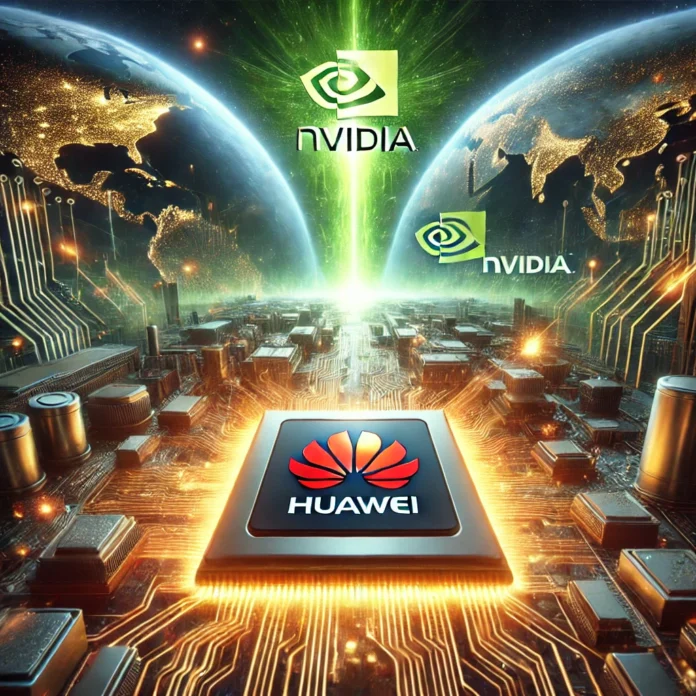In a bold move that could reshape the global AI hardware landscape, Huawei Technologies has developed its most advanced AI processor to date, the Ascend 910D, designed to rival Nvidia’s industry-leading chips. Announced just weeks after U.S. restrictions limited Nvidia’s H20 chip sales to China, Huawei’s latest innovation signals a significant escalation in the race for AI supremacy. This development, reported by The Wall Street Journal on April 28, 2025, underscores China’s ambition to achieve technological self-reliance amid intensifying geopolitical tensions.
A Strategic Response to U.S. Sanctions
Huawei’s Ascend 910D is positioned as a direct competitor to Nvidia’s high-end AI chips, which dominate the global market for training and deploying large-scale AI models like GPT and Claude. The timing of Huawei’s announcement is critical: U.S. export controls, tightened in early 2025, have restricted China’s access to Nvidia’s H20 chips, designed specifically for the Chinese market to comply with earlier sanctions. These restrictions have created a vacuum that Huawei is eager to fill, leveraging its domestic manufacturing capabilities and government-backed support. Posts on X reflect the sentiment, with users noting Huawei’s rapid response to U.S. curbs as a sign of China’s growing technological prowess.
The Ascend 910D reportedly matches or exceeds the performance of Nvidia’s restricted chips in key benchmarks, particularly for AI workloads like natural language processing and image generation. While technical details remain scarce, early reports suggest Huawei has optimized the chip for energy efficiency and scalability, critical factors for data centers powering generative AI models. This aligns with Huawei’s broader strategy to bolster its Ascend series, which has gained traction in China’s AI ecosystem since the company pivoted to domestic chip production following U.S. sanctions in 2020.
Implications for the Global AI Market
Huawei’s entry into the high-end AI chip market could disrupt Nvidia’s near-monopoly, which commands over 80% of the global AI chip market share. Nvidia’s stock dipped slightly following the news, reflecting investor concerns about increased competition. Meanwhile, AMD, another key player, may also face pressure as Huawei targets both domestic and international markets. Analysts predict that Huawei’s chip could capture significant market share in China, where demand for AI infrastructure is surging, driven by applications in robotics, autonomous vehicles, and smart cities.
Beyond China, Huawei’s chip could appeal to countries seeking alternatives to U.S.-dominated hardware, particularly in regions wary of Western sanctions. However, Huawei faces challenges in scaling production and navigating export restrictions imposed by the U.S. and its allies, which could limit its global reach. The company’s ability to compete will also depend on software compatibility, as Nvidia’s CUDA platform remains a cornerstone of AI development worldwide.
Ethical and Geopolitical Dimensions
Huawei’s push into AI chips raises critical questions about the ethics and governance of AI technology. The development of advanced AI hardware in a geopolitically charged environment risks exacerbating tensions between global powers. Concerns about data privacy, surveillance, and the potential militarization of AI have long surrounded Huawei, given its ties to the Chinese government. These issues are amplified as Huawei seeks to integrate its chips into AI systems powering sensitive applications like facial recognition and autonomous systems.
Moreover, the U.S.-China tech rivalry highlights the need for global AI regulation. While the U.S. has focused on export controls to curb China’s access to cutting-edge technology, there is no cohesive international framework to address the ethical implications of AI hardware proliferation. Policymakers face the challenge of balancing innovation with security, ensuring that advancements in AI do not come at the cost of human rights or global stability.
What’s Next for Huawei and the AI Industry?
Huawei’s Ascend 910D is set to undergo testing in the coming months, with commercial deployment expected by mid-2025. If successful, the chip could accelerate China’s AI ambitions, reducing reliance on foreign technology and fostering a self-sufficient AI ecosystem. For global AI companies, Huawei’s rise signals a new era of competition, where innovation, geopolitics, and ethics are inextricably linked.
As the AI race intensifies, stakeholders must navigate a complex landscape of technological breakthroughs and regulatory hurdles. Huawei’s latest move is a reminder that the future of AI is not just about algorithms and models but also about the hardware that powers them and the policies that shape their use.




